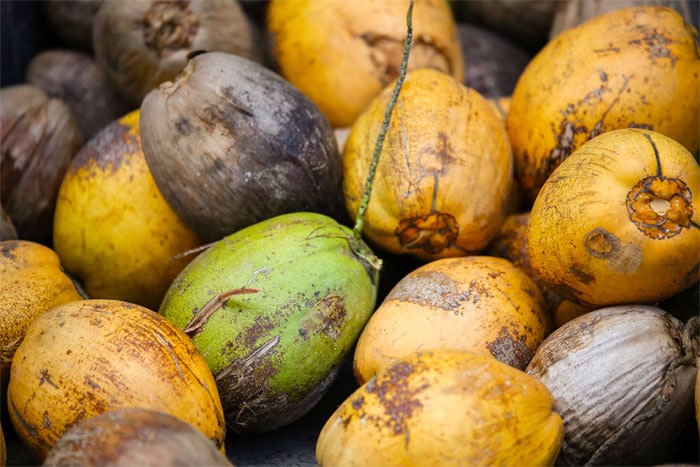
Written By: Owennie Lee, RD
Title: Registered Dietitian
Alumni: University of British Columbia
Last Updated on:

Coconut is hot. From coconut milk, coconut yogurt, and coconut creamer to coconut water and coconut oil, these coconut food products are definitely on their way to stardom. Here is the low down on the various coconut food products on the market.

Table of Contents
Coconut water is definitely a hot new commodity you should keep an eye out for. It is a beverage usually made with the water that is naturally found inside a young coconut, like Vitacoco and One, but can also be extracted from mature coconut (e.g., Kero Coco). Coconut water is slightly sweet but high in electrolytes, which is why it has been used as an intravenous fluid in times of war. Nowadays, we do not have to inject it to enjoy it, as it is made available to us in a tetra pack. Most coconut water products are marketed as sports drinks naturally high in electrolytes, but Institute of Food Technologists (IFT) spokesperson Dr. Roger Clemens revealed that most research suggests that the sodium level in coconut water is too low for adequate post-exercise replenishment. Regardless of its effectiveness in boosting sports performance, coconut water is definitely a lower-calorie option to soda and other sweetened drinks.
Tired of soy or rice milk as cow’s milk alternatives? Try a coconut milk drink, such as those from So Delicious. Coconut milk is a new dairy-free beverage that is made from coconut cream with or without added sugar. Like some other dairy alternatives, coconut milk is NOT a good source of calcium, so don’t count on it to help meet your daily calcium requirement. Aside from coconut milk, a whole lineup of coconut milk products, such as coconut milk creamer, coconut milk yogurt and even coconut milk frozen desserts are also available. There is definitely no shortage of ways to enjoy this new coconut drink.
Like coconut water, coconut oil has a longstanding track record. For centuries, it has been used by people throughout the tropical world. Coconut oil is the oil extracted from the meat of a mature coconut. Because it is primarily made up of saturated fatty acids, coconut oil is very heat stable and has a high smoke point, which makes it useful in cooking and frying. It is also why coconut oil is comparatively stable and does not become rancid quickly. Unlike the hydrogenated coconut oil used in manufactured foods, virgin or “refined, bleached, and deodorized” (RBD) coconut oil that is sold on store shelves, such as Spectrum Organics, does not contain trans fats. As coconut oil contains high levels of medium-chained triglycerides (MCT, a type of saturated fat), coconut oil supporters claim that this exotic oil can boost metabolism, help you lose weight, and fight infections. But you should know that the scientific evidence in support of such claims is very weak. The only substantiated health benefit of MCT, according to Dr. Clemens, who is a professor at the USC School of Pharmacy, is for patients with disorders such as cystic fibrosis or gastrointestinal diseases.
Coconut has definitely attracted some loyal followers, but humans are not the only creatures that eat it. Apparently, some chickens are on a coconut-based diet too!
Alumni: University of British Columbia – Owennie is a registered dietitian with a soft spot for chocolate and coffee. She is a believer in balance and moderation, and is committed to keeping healthy eating enjoyable and fun. Owennie received her dietetics training in Vancouver, and is a member of Dietitians of Canada and the College of Dietitians of British Columbia. She has experience in a wide variety of settings, such as clinical nutrition, long-term care and outpatient counseling. Owennie has also worked for a community nutrition hotline and participated regularly as a guest radio host, where she enjoyed sharing her passion and knowledge about food and nutrition with people.
coconut, coconut oil, coconut water